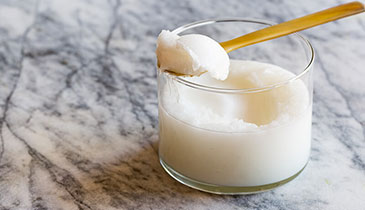 Source: A Food Centric Life
Source: A Food Centric Life
Is coconut oil healthy or not? If you’re confused, it’s no wonder. Last week’s nutrition controversy began with a viral USA Today headline shouting “coconut oil isn’t healthy and it’s never been healthy” surprised many. That startling announcement was due to a presidential advisory published by the American Heart Association (AHA) advising people to replace saturated fats, as in coconut oil, with omega-6 polyunsaturated fats from vegetable oils.
Before you toss your coconut oil, remember there are always two sides to the story and blanket statements are often misleading. Read the facts, explore the links, then make your own decision. Coconut oil stays in my kitchen as a healthy fat.
Coconut Oil Healthy or Not?
Coconut oil stands unfairly judged because of its high saturated fat content. But the saturated fat in coconut oil comes in the form of healthy, medium-chain triglycerides (MCT’s) or medium-chain fats. Your body metabolizes (or burns) MCT’s more like carbs, for energy. Instead of storing them as fat, the calories are converted into energy for immediate use by your body.
Additionally, coconut oil is made up of lauric, capric, and caprylic acids, great food for your brain. Plus coconut oil has anti-bacterial, anti-microbial, and anti-fungal properties. And something else, all saturated fats are not created equal and coconut oil offers health benefits. Sounds pretty good to me.
That coconut oil is high in saturated fat and can increase total cholesterol not new news. What’s odd is that the AHA doesn’t link eating coconut oil to higher risk for heart attacks and strokes, but to higher cholesterol.
Functional Medicine Doctor, Will Cole, wrote “the reality is, total cholesterol is a poor predictor for assessing heart attack and stroke risk. Studies have found that there might be no association between high total cholesterol and heart attack and stroke risk.” In fact a growing number of studies show lowering saturated fat and cholesterol do not decrease heart attacks.
So What’s The Problem?
If you eat refined carbs like white bread, white rice or foods made with white flour (which quickly turn to sugar in your blood), eating them with saturated fat increases inflammation. If you eat lots of vegetables and eschew poor quality refined carb foods, the saturated fat in coconut oil can be healthy. Of course no one recommends you eat a jar a day, but a tablespoon or two should be fine. Listen to your body and do what works best for you.
Some people do better with a little more fat, some with less. That is always the best prescription for a healthy diet. Look at the bigger picture of your diet, not just one ingredient.
The Health Benefits of Coconut Oil
More surprising to me is that the AHA recommends vegetable oils. Most vegetables oils are industrially processed, produced with high heat and chemicals. Not healthy options at all. Vegetable oils are usually GMO and made with non-organic soybeans, corn, and canola (aka rapeseed). Additionally, the AHA recommended more omega-6 fats. My problem with that recommendation is that many Americans already consume too many omega-6 fats because of a diet high in processed and fast foods. Too much, or an imbalance with omega-3 fats creates inflammation.
For a read great posts on coconut oil, read 10 Impressive Health Benefits of Coconut Oil or 20 Coconut Oil Benefits. Find additional good posts on this debate at MindBodyGreen and GreenMedInfo. And here’s a great read on types of saturated fat.
The Bottom Line
Coconut oil can be a healthy source of fat in an otherwise overall healthy diet, because of its medium-chain fat content. Be sure to buy unrefined, cold -pressed, extra virgin coconut oil. Saturated fats, like coconut oil, are not all bad. The fats to avoid are trans fats, fried fats, some saturated fats (like palmitic oil), and industrially produced, poor quality vegetables oil, as in cooking oil and in processed and refined foods. When cooking with coconut oil, it’s good for medium heat cooking such as light sautéing.
For additional delicious recipes and informative articles, check out Sally’s blog A Food Centric Life.




